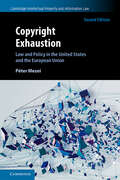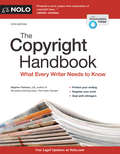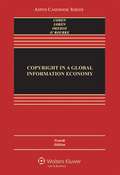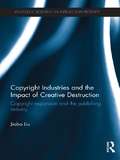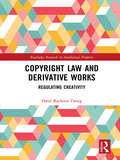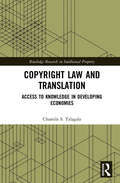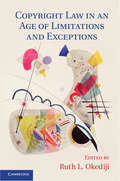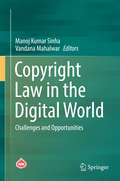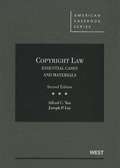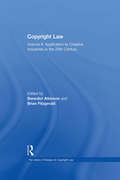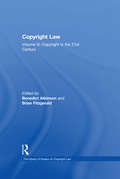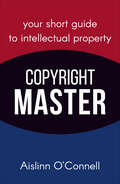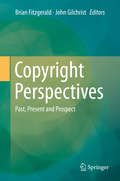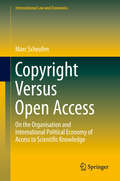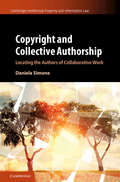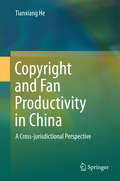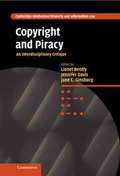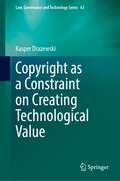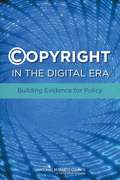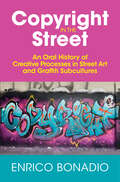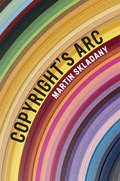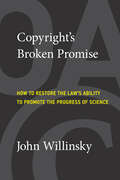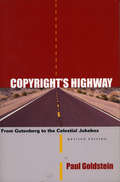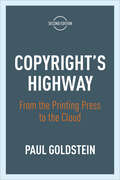- Table View
- List View
Copyright Exhaustion: Law and Policy in the United States and the European Union (Cambridge Intellectual Property and Information Law)
by Péter MezeiIn the Second Edition of Copyright Exhaustion, copyright scholar Péter Mezei offers an expanded examination of copyright exhaustion, including its historical development, theoretical framework, practical applications, and policy considerations. He includes updated case law and statutory developments for the first-sale doctrine in the United States and in the European Union, covering both analogue and digital applications with an eye toward scrutinizing the common rejection of exhaustion in the resale of digital subject matter including computer programs, sound recordings, audiovisual works, and e-books. He advocates for a digital first-sale doctrine that would offer legal consistency to copyright law and a technologically feasible framework for content producers and consumers.
Copyright Handbook, The: What Every Writer Needs to Know
by Stephen FishmanWhat copyright law protects....and doesn't No writers like to see their hard work or creativity copied by others - or to be accused of copying. Fortunately, The Copyright Handbook provides everything you need to protect yourself! Find information and forms to help you: register your work maximize copyright protection transfer ownership of copyright avoid infringement deal with infringers understand the "fair use" rule get permission to use copyrighted work profit from your copyright This edition is updated to provide the latest copyright regulations, forms and rules for filing a copyright application.
Copyright In A Global Information Economy 4e (Aspen Casebook Ser.)
by CohenCopyright in a Global Information Economy explores the full range of copyright law and its relationship to technological innovations and globalization. Written with precision and clarity, this ambitious yet manageable casebook elucidates the fundamental disputes of copyright law with incisive and balanced perspective. The book features comprehensive coverage of domestic and international copyright law, a balanced treatment of controversial issues, as well as a wide selection of concisely edited cases, engaging and practical examples and discussions, and photographs that facilitate and stimulate discussion of cases.
Copyright Industries and the Impact of Creative Destruction: Copyright Expansion and the Publishing Industry (Routledge Research in Intellectual Property)
by Jiabo LiuThis book examines the relationship between the legal extension of copyright duration as an enduring means of copyright protection and the growth of the UK book publishing industry as a typical creative industry reliant on copyright. The book draws on Schumpeter’s theory of creative destruction to analyse the implications of copyright law and policy on the book industry and illustrate the dynamic interaction between copyright expansion and the growth of the creative industries. The book reviews the historical development of UK copyright expansion and also considers copyright in the digital age. It explores the legal and economic concerns about copyright protection in general, and the expansion of copyright duration in particular. Using an innovative empirical method, it explores whether the expansion of the duration of copyright promotes or precludes the growth of book publishing industry. It goes on to suggest changes to copyright policy which would have an impact on the economics of innovation in the creative industries. This book will be of particular interst to scholars and students of Intellectual Property Law.
Copyright Law and Derivative Works: Regulating Creativity (Routledge Research in Intellectual Property)
by Omri Rachum-TwaigCopyright law regulates creativity. It affects the way people create works of authorship ex-ante and affects the status of works of authorship significantly ex-post. But does copyright law really understand creativity? Should legal theories alone inform our regulation of the creative process? This book views copyright law as a law of creativity. It asks whether copyright law understands authorship as other creativity studies fields do. It considers whether copyright law should incorporate non-legal theories, and if so, how it should be adjusted in their light. For this purpose, the book focuses on one of the many rights that copyright law regulates – the right to make a derivative work. A work is considered derivative when it is based on one or more preexisting works. Today, the owner of a work of authorship has the exclusive right to make derivative works based on her original work or to allow others to do so. The book suggests a new way to think about both the right, the tension, and copyright law at large. It proposes relying on non-legal fields like cognitive psychology and genre theories, and offers new legal-theoretical justifications for the right to make derivative works. As the first book to consider the intersection between copyright law, creativity and derivative works, this will be a valuable resource for students, scholars, and practitioners interested in intellectual property and copyright law.
Copyright Law and Translation: Access to Knowledge in Developing Economies (Routledge Research in Intellectual Property)
by Chamila S. TalagalaArguing that the translation of scientific and technical learning materials, and the publication of these translations in a timely and affordable manner, is crucially important in promoting access to scientific and technical knowledge in the developing world, this book examines the relationship between copyright law, translation and access to knowledge. Taking Sri Lanka as a case study in comparison with India and Bangladesh, it identifies factors that have contributed to the unfavourable relationship between copyright law and the timely and affordable translation of scientific and technical learning materials, such as colonisation, international copyright law, the trade interests of the developing economies and a lack of expertise and general lack of awareness surrounding copyright law in the developing world. Highlighting the need to reform international copyright law to promote the needs and interests of developing countries such as Sri Lanka, the book points to a possible way forward for developing countries to achieve this and to address the problem of striking a proper and delicate balance in their copyright laws between the protection of translation rights and the ability of people to access translations of copyright protected scientific and technical learning materials.
Copyright Law in an Age of Limitations and Exceptions
by Okediji Ruth L.Copyright Law in an Age of Limitations and Exceptions brings together leading copyright scholars and the field's foremost authorities to consider the critical role of copyright law in shaping the complex social, economic, and political interaction critical for cultural productivity and human flourishing. The book addresses defining issues facing copyright law today, including justifications for copyright law's limitations and exceptions (L&Es), the role of authors in copyright, users' rights, fair use politics and reform, the three-step test in European copyright law, the idea/expression principle with respect to functional works, limits on the use of L&Es in scientific innovation, and L&Es as a tool for economic development in international copyright law. The book also presents case studies on the historical development of the concept of 'neighboring rights' and on Harvard Law School's pioneering model of global copyright education, made possible by the exercise of L&Es across national borders.
Copyright Law in the Digital World: Challenges and Opportunities
by Manoj Kumar Sinha Vandana MahalwarThis book addresses the key issues, challenges and implications arising out of changes in the copyright law and corresponding judicial responses. Using concrete examples, the book does not assume any prior knowledge of copyright law, but brings together leading intellectual property researchers to consider the significant role of copyright law in shaping the needs of the modern digital world. It provides an insight into two distinct arenas: copyright and digital media. The exponential increase in the ability to multiply and disseminate information by digital means has sparked numerous conflicts pertaining to copyright - and in turn has prompted lawmakers to expand the scope of copyright protection in the digital age. Bearing in mind the new questions that the advent of the digital age has raised on the role and function of copyright, the book presents a collection of papers largely covering new frontiers and changing horizons especially in this area. The contributions intensively address core issues including the exhaustion principle, copyright and digital media, liability of hosting service providers, the originality requirement, accessibility to published works for the visually disabled, criminalization of copyright infringement, and software protection under copyright law, among others. Consisting of 14 papers, this book will be equally interesting to researchers, policymakers, practitioners and lawmakers, especially those active in the field of Intellectual Property Rights (IPR).
Copyright Law: Essential Cases and Materials
by Joseph P. Liu Alfred C. YenThis casebook emphasizes the essential cases and materials at the heart of copyright law. The result is a streamlined and well-organized casebook of manageable length that keeps the central themes of copyright front and center. It also provides access to a companion Web site containing an extensive library of additional modules, topics, edited cases, notes, problems, and audio-visual materials. Together these materials, along with a companion teacher's manual, allow teachers to easily customize the copyright law course to suit their specific goals. The authors have written extensively about copyright, the arts, and the impact of new technology.
Copyright Law: Volume II: Application to Creative Industries in the 20th Century (The Library of Essays on Copyright Law)
by Brian Fitzgerald Benedict AtkinsonThis volume reproduces writings, social teachings, testimonies and reports of figures as diverse as Karl Marx, Victor Hugo, Charles Dickens and Mark Twain, and bodies such as the US Congress. Extracted material charts the development of an international system of copyright regulation, and the growth, in the 20th century, of copyright industries benefitting from new copyright laws. In the second half of the 19th century, many writers and thinkers, like Marx, attacked capital, and its corollary, property rights. Some writers, such as Victor Hugo, while exposing the horrors of poverty and social alienation, demanded for authors rights of property. The modern system of copyright substantially originates from the efforts of Hugo and others. Articles by leading US copyright scholars such as Jessica Litman and Tim Wu explain the development of copyright law in the 20th century, and are complemented by reproduction of key copyright cases in the US and UK, as well the primary copyright legislation in those countries. Contributors examine critically whether copyright law in the 20th century developed to encourage information dissemination or enable producers to control the supply of information for super profit.
Copyright Law: Volume III: Copyright in the 21st Century
by Benedict AtkinsonThis volume shows how, since 1950, the growth of copyright regulation has followed, and enabled, the extraordinary economic growth of the entertainment, broadcasting, software and communications industries. It reproduces articles written by an extensive list of leading thinkers. US scholars represented in readings include James Boyle, Lawrence Lessig, Pamela Samuelson, Mark Lemley, Alfred Yen, Julie Cohen, Peter Jaszi and Eben Moglen. Leading non-US contributors include Alan Story, Brian Fitzgerald and Peter Drahos. These and other authors explain copyright origins, the development of the law, the theory of enclosure, international trends, recent developments, and current and future directions. Today, the copyright system is often portrayed as an engine of growth, and effective regulation as a predictor of economic development. However, critics see dangers in the expansion of intellectual property rights. The articles in this volume focus principally on the digital age, examining how copyright regulation is likely to affect goals of dissemination and access.
Copyright Master
by Aislinn O'ConnellThe perfect distillation of everything you need to know about copyright law.Covering everything from copyright’s early history to the protection of cutting-edge software, Copyright Master is a concise, practical guide through the labyrinth of licensing and intellectual property.Whether by explaining the Creative Commons system, providing a useful guide to takedown notices, or examining the process for licensing orphan works, Copyright Master forms an ideal primer. It will help you use content imaginatively and judiciously, detailing what you can do without licences, including fair use, American legislation and recent amendments to British fair dealing rules. Finally, Copyright Master looks into the future of this rapidly-changing field and examines how the EU’s Digital Single Market strategy will shape digital copyright in the years to comePacked with tips, links, and other practical information, this is an essential guide for anyone wanting to create and use copyright with confidence.
Copyright Perspectives: Past, Present and Prospect
by Brian Fitzgerald John GilchristThis book provides international and domestic perspectives on the law of copyright and is led by a foreword on the future of copyright by Dr Francis Gurry, Director General of WIPO and a chapter on the lessons for copyright policy in classical Roman law, by Justice Arthur Emmett. The body of this collection covers current perspectives in the digital age, from the application of the Berne Convention, to time shifting and intermediary copyright liability, as well as perspectives from developing and developed countries covering laws, user rights, open access, government use of copyright material and the use of the criminal law to proscribe copyright infringement.
Copyright Versus Open Access: On the Organisation and International Political Economy of Access to Scientific Knowledge (International Law and Economics)
by Marc ScheufenThis book addresses the recent debate about copyright law and its impact on the distribution of scientific knowledge from an economic perspective. The focus is on the question whether a copyright regime or an open access regime is better suited to the norms and organizational structure in a purely global science community. The book undertakes a thorough economic analysis of the academic journal market and showcases consequences of a regime change. It also takes account of the Digital Divide debate, reflecting issues in developing countries. Finally, a comprehensive analysis of legal action in the light of international Intellectual Property (IP) agreements offers prospects on the future of academic publishing.
Copyright and Collective Authorship: Locating the Authors of Collaborative Work (Cambridge Intellectual Property and Information Law #50)
by Daniela SimoneAs technology makes it easier for people to work together, large-scale collaboration is becoming increasingly prevalent. In this context, the question of how to determine authorship – and hence ownership - of copyright in collaborative works is an important question to which current copyright law fails to provide a coherent or consistent answer. In Copyright and Collective Authorship, Daniela Simone engages with the problem of how to determine the authorship of highly collaborative works. Employing insights from the ways in which collaborators understand and regulate issues of authorship, the book argues that a recalibration of copyright law is necessary, proposing an inclusive and contextual approach to joint authorship that is true to the legal concept of authorship but is also more aligned with creative reality.
Copyright and Fan Productivity in China: A Cross-jurisdictional Perspective
by Tianxiang HeThis book takes a unique approach to mitigate the problem of massive online copyright infringement and justify fan activities. It argues for a cooperative approach that encourages copyright owners to exert a degree of control over their fan creators. In contrast to the current approach, which treats fan utilizations as theft, this book suggests that the copyright owners and the lawmakers should instead distinguish between fan creators and commercial pirates, allowing them unleash their potential. This book offers a clear and comprehensive account of the fascinating aspects of legal problems created by fan activities in China, Japan and the United States, offering a valuable guide for students, practitioners, academics and entrepreneurs whose work involves or who are interested in cutting-edge legal issues in the creative industry. "Tianxiang He introduces us to the world of fandom inhabited by 'fan-subbers', fan-dubbers', 'mash-uppers', and 'fan-fictionists' against the backdrop of copyright law and policy in China. His work is engaging in that it not merely describes the law, but also the political dimension where copyright and state media control converge into a reality where being an artist or a fan is not that straightforward. " -- Prof. Anselm Kamperman Sanders, School of Law, Maastricht University "The tension between copyright holders and fan communities has been increasingly salient yet underexplored. This timely, insightful and deeply engaging book not only fills a niche, but also covers a country that has been rarely examined in this context. The book advances a promising model for the two groups to cooperate. It also explores complex issues concerning political culture, media regulation and civic engagement in China. A must read for anybody interested in copyright law, cultural production, digital technology or Chinese information policy. " -- Prof. Peter K. Yu, Professor of Law and Director, Cen ter for Law and Intellectual Property, Texas A&M University School of Law
Copyright and Piracy: An Interdisciplinary Critique
by Lionel Bently Jennifer Davis Jane C. GinsburgAn understanding of the changing nature of the law and practice of copyright infringement is a task too big for lawyers alone; it requires additional inputs from economists, historians, technologists, sociologists, cultural theorists and criminologists. Where is the boundary to be drawn between illegal imitation and legal inspiration? Would the answer be different for creators, artists and experts from different disciplines or fields? How have concepts of copyright infringement altered over time and how do such changes relate, if at all, to the cultural norms operating amongst creators in different fields? With such an approach, one might perhaps begin to address the vital and overarching question of whether strong copyright laws, rigorously enforced, impede rather than promote creativity. And what can be done to avoid any such adverse consequences, while maintaining the effectiveness of copyright as an incentive-mechanism for those who need it?
Copyright and Popular Media
by Trajce CvetkovskiCopyright governance is in a state of flux because the boundaries between legal and illegal consumption have blurred. Trajce Cvetkovski interrogates the disorganizational effects of piracy and emerging technologies on the political economy of copyright in popular music, film and gaming industries.
Copyright as a Constraint on Creating Technological Value (Law, Governance and Technology Series #63)
by Kasper DrazewskiCan we regulate something that doesn’t exist yet? Can Europe create its own Silicon Valley? Who gets to create technological value in today’s world? Whatever happened to the once-flourishing idea of rags to riches? Will new and exciting innovations only ever come from big tech companies? Can the EU establish its own flexible framework for boosting innovation, e.g. by facilitating the transformative use of technologies and data?This book seeks to answer these questions by exploring the differences in copyright culture in Europe and the United States, with its flexible fair use framework. The findings are anything but obvious, and decades of case law on both sides of the Atlantic tell a story of judges going to great lengths to deal with new challenges while navigating the imperfections of statutory law – both where it is too broadly formulated and where it is too prescriptive.How can the population’s creative potential best be fostered? What do software innovations have in common with the evolution of living organisms? What are the vulnerabilities of distributed creativity? Answers are sought in the processes that came into being during the early years of the digital revolution and were then forced to take a back seat as control of the means of production was increasingly placed in the hands of tech companies. The findings and insights presented here are highly relevant for today’s digital policymaking. Market concentration processes in innovation haven’t ceased; they are ongoing. And in an age where data-driven services are creating and reinforcing global oligopolies, the question posed by the U.S. Supreme Court in Google v. Oracle is now more relevant than ever: who should hold the keys to digital innovation?
Copyright in the Digital Era
by Stephen A. MerrillOver the course of several decades, copyright protection has been expanded and extended through legislative changes occasioned by national and international developments. The content and technology industries affected by copyright and its exceptions, and in some cases balancing the two, have become increasingly important as sources of economic growth, relatively high-paying jobs, and exports. Since the expansion of digital technology in the mid-1990s, they have undergone a technological revolution that has disrupted long-established modes of creating, distributing, and using works ranging from literature and news to film and music to scientific publications and computer software. In the United States and internationally, these disruptive changes have given rise to a strident debate over copyright's proper scope and terms and means of its enforcement--a debate between those who believe the digital revolution is progressively undermining the copyright protection essential to encourage the funding, creation, and distribution of new works and those who believe that enhancements to copyright are inhibiting technological innovation and free expression. Copyright in the Digital Era: Building Evidence for Policy examines a range of questions regarding copyright policy by using a variety of methods, such as case studies, international and sectoral comparisons, and experiments and surveys. This report is especially critical in light of digital age developments that may, for example, change the incentive calculus for various actors in the copyright system, impact the costs of voluntary copyright transactions, pose new enforcement challenges, and change the optimal balance between copyright protection and exceptions.
Copyright in the Street: An Oral History of Creative Processes in Street Art and Graffiti Subcultures (Cambridge Law Handbooks Ser.)
by Enrico BonadioThis book explores how copyright laws are perceived within street art and graffiti subcultures to examine how artists and writers view certain creative aspects of their own practice. Drawing on ethnographic research and fieldwork, the book gives voice to the main actors of these communities and highlights their feelings and opinions toward issues that are increasingly impacting their everyday life and work. It also touches on related and complementary issues, such as the 'gallerisation' or economic exploitation of these forms of art and the curious similarities between the graffiti and advertising worlds. Unique and comprehensive, Copyright on the Street brings the 'voice from the street' into the debate over the legal and non-legal protection of street art and graffiti.
Copyright's Arc: The Case For Tying Intellectual Property Rights To National Wealth
by Martin SkladanyIn Copyright's Arc, Martin Skladany rejects a one-size-fits-all copyright regime. Within developed countries, copyright's incentives have spawned multinational corporations that create a plethora of slick, hyped entertainment options that encourage Americans to overconsume, whereas in developing countries, extreme copyright blocks the widespread distribution of entertainment, which impedes women's equality and human rights movements. Meanwhile, moderate copyright in middle-income countries helps foster artistic movements that forge inclusive national identities. Given these conditions, Skladany argues that copyright should vary between countries, following an arc across the development spectrum.
Copyright's Broken Promise: How to Restore the Law's Ability to Promote the Progress of Science
by John WillinskyA comprehensive proposal for reforming copyright law to ensure sustainable public access to research and scholarship.Open access is widely supported by researchers, librarians, scholarly societies, and research funders, as well as large and small publishers. Yet despite this support—and the pandemic&’s demonstration of the importance of open access for scientific progress—the scholarly publishing market is failing to deliver open access quickly enough. In Copyright&’s Broken Promise, John Willinsky presents the case for reforming copyright law so that it supports, rather than impedes, public access to research and scholarship. He draws on the legal strategy of statutory licensing to set out the terms and structures by which the Copyright Act could ensure that publishers are fairly compensated for providing immediate open access. What sets Willinsky&’s analysis apart is its focus on the current state of scholarly publishing. Because copyright offers so little legal support for moving publishing to open access, though it is best for science, he says it is time to stop regarding the Copyright Act as a law of nature that can only be circumvented, contravened, or temporarily set aside. Specifically, he proposes that the Copyright Act add a new category of work, called &“research publications,&” which would be subject to statutory licensing. This would allow publishers to receive royalty payments from the principal institutional users (universities, industry R&D, research institutes, and so on) and sponsors of the work (foundations and government agencies), while providing immediate open access.
Copyright's Highway
by Paul GoldsteinFrom eighteenth-century copyright law, to current-day copyright issues on the internet, to tomorrow's "celestial jukebox”-a digital repository of books, movies, and music available on demand-Paul Goldstein presents a thorough examination of the challenges facing copyright owners and users. One of the nation's leading authorities on intellectual property law, Goldstein offers an engaging, readable, and intelligent analysis of the effect of copyright on American politics, economy, and culture. Goldstein presents and analyzes key legal battles, including Supreme Court decisions on home taping and 2 Live Crew's contested sampling of Roy Orbison's "Pretty Woman. ” In this revised edition, the author expands the discussion to cover electronic media, including an examination of recent Napster litigation, the Digital Millennium Copyright Act, and the vexed Secure Digital Music Initiative, under which record companies attempted to develop effective encryption standards for their products. Praise for the first edition: "A clever and vibrant book that traces copyright history from the invention of the printing press through current challenges to copyright from new technologies . . . . Most compelling [on] multimedia technologies. ” -Sabra Chartrand,The New York Times "This eminent authority writes with clarity, lucidity and a wry sense of humor about a subject whose complexities can be daunting. " -Jonathan Kirsch,Los Angeles Times "A wonderfully American tale of how law, literature, politics and megabucks intersect. " -William Petrocelli,San Francisco Chronicle
Copyright's Highway: From the Printing Press to the Cloud, Second Edition
by Paul GoldsteinIn Copyright's Highway, one of the nation's leading authorities on intellectual property law offers an engaging, readable, and intelligent analysis of the effect of copyright on American politics, economy, and culture. From eighteenth-century copyright law, to the "celestial jukebox," to the future of copyright issues in the digital age, Paul Goldstein presents a thorough examination of the challenges facing copyright owners and users. In this fully updated second edition, the author expands the discussion to cover the latest developments and shifts in copyright law for a new audience of scholars and students. This expanded edition introduces readers to present and future debates regarding copyright law and policy, including a new chapter on the technological shift in emphasis from producer to consumer and the legal shift from exclusive rights to exceptions and limitations to those rights. From Gutenberg to Google Books, Copyright's Highway, Second Edition, offers a concise, essential resource for the internet generation.
